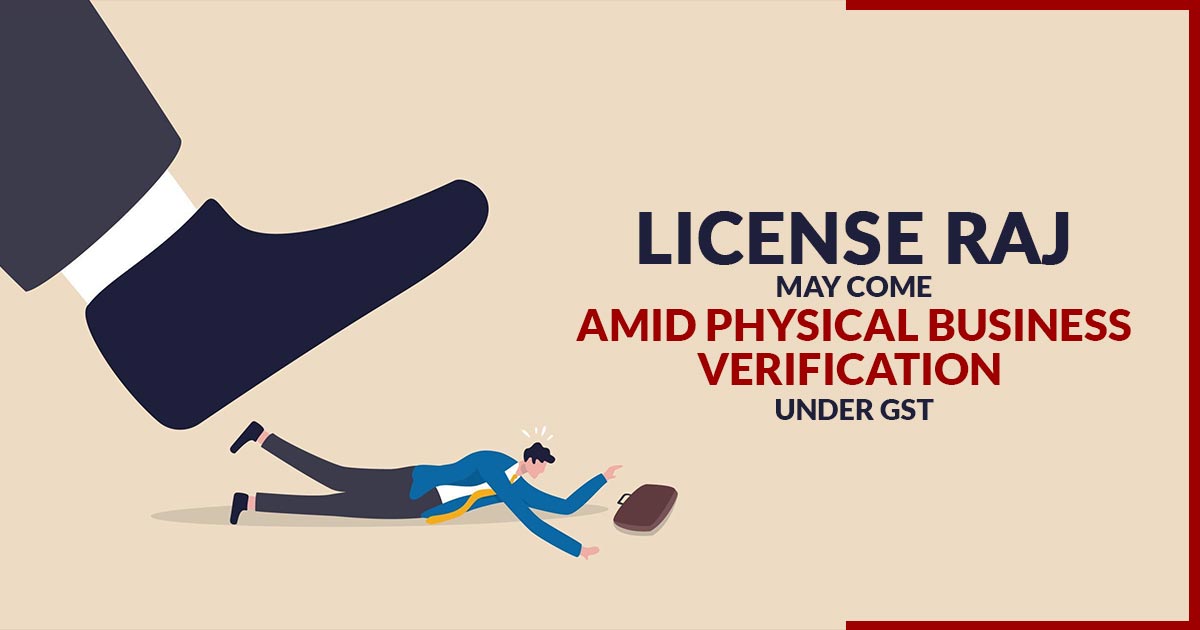
Micro and small enterprises worry a bit much about the suspension or rejection of GST registration amidst growing physical intervention by GST authorities.
The industry organisation for small enterprises believes that the licence raj may come back as the GST officers are physically visiting locations to confirm addresses and detect fraudulent activities.
The separate operation, which is also a part of the two-month nationwide drive initiated by Central and State GST offices on May 16. This major move is expected to be in force till July 15 and will be detecting fraud GST registrations, fake invoices, and much more.
Read Also: Fraudsters’ Mind vs Govt Intelligence for Fake GST Invoices
Vinod Kumar, President of the India SME Forum (ISF) and the Forum for Internet Retailers, Sellers, and Traders (FIRST) stated that more than 700 entities have reached out to them in the last three to four days. The business is worrying about suspension and cancellation of GST registration because of some illegal practices such as using co-working space or shared warehousing.
Kumar concluded that the six-year effort to make the taxing procedure faceless and unnecessary in light of such physical drive.
The organisation is in consultation with central and state GST officials. This is done to raise awareness about the important things about small and micro business concerns.
GST officials’ visits physically to the entities will not assist in reducing compliance and compliance expenses; instead, they will not bring positive outcomes, according to Federation of Madras Merchants and Manufacturers Association President Vinod Nair, the president of the Federation of Madras Merchants and Manufacturers Association. The final consumer will be burdened by all these prices.
A source familiar with the situation said that the officials have a target to achieve, and in order to do that, they came up with this decision.
Read Also: Special All-India Drive Via GST Instruction No. 01/2023 for Fake GSTIN
The president of the Gujarat Chamber of Commerce and Industry, Shailesh Patwari, stated that some current issues need to be resolved. The visits will just make the concerns worse rather than help sort them out.
Patwari continued, saying that even if there is just one fraud seller in a network of legitimate suppliers, the GST officers penalise all the merchants. Such bottlenecks require attention.
In contrast to the past, GST officials now have the authority to cancel the licences in addition to making site visits to confirm GST-related information.
Despite following the rules, several small and microbusinesses have lost their licences as a result of these physical visits by the GST officials, according to sources. Further, Kumar added that the process of getting the cancelled licence back is a long one once the registration gets cancelled.
Kumar made the following statement in response to news that GST officials had detected 10,000 bogus GST registrations. In these registrations, 20% may have followed the books yet ended up in this scenario. The majority of these small enterprises may not have the resources (such as tax consultants) to respond to the GST authorities. Even if they are innocent, they pay the price.
More and more companies are choosing to use shared spaces as an address for GST registration as a result of increased awareness of coworking and shared storage. Kumar continued stating that there is no rule to stop the use of a shared address while registering for GST. As a result, many companies have chosen shared space as a way to cut costs.
The requirement for an application where firms can submit their activity details to reduce costs is by various bodies of small and micro businesses.
The industry body believed that this move would force more and more small enterprises to continue operating within the same boundaries and not grow into big ones and that some would even decide to form multiple companies in order to avoid being subject to the GST ambit. Nair continued by adding that compliance costs have to be reduced if you want small and micro businesses to join the GST ambit.
More companies will register if there are lower compliance expenses and less paperwork or administrative work. GST, I-T, and other agencies require the majority of small businesses to provide the same information. This unnecessary duplication of paperwork, according to Kumar, should also stop.









